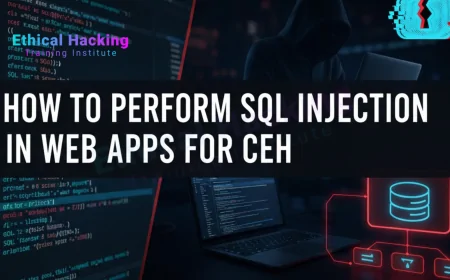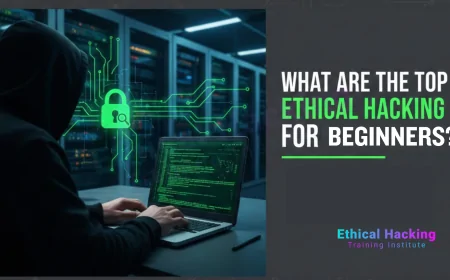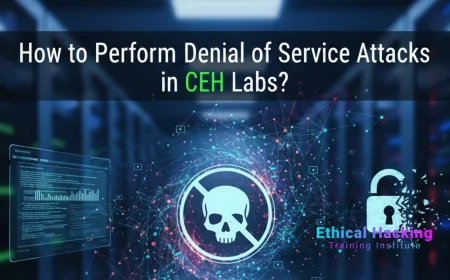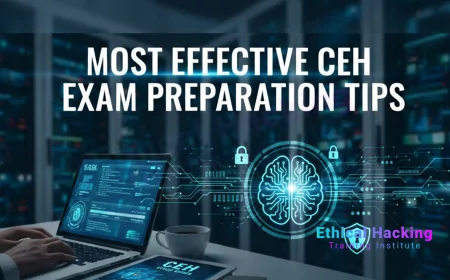How to Become a Certified Hacker: The Essential Skills and Courses You Need | How to Launch Your Career as a Certified Hacker: Skills & Course Guide
Learn how to become a certified ethical hacker in 2025. Discover essential skills, top certifications, career paths, and expert-recommended courses.
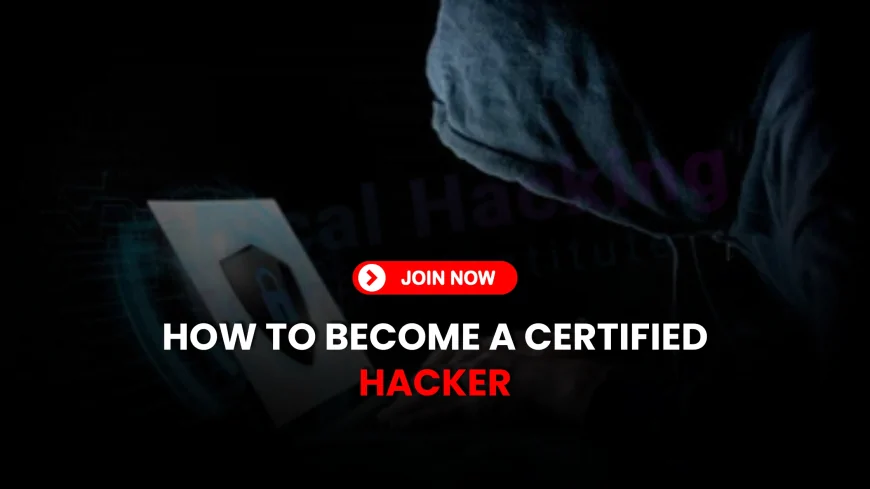
Table of Contents
- Introduction
- Why Become a Certified Hacker?
- Core Skills Every Ethical Hacker Needs
- Key Certifications You Can Pursue
- CEH – Certified Ethical Hacker
- OSCP – Offensive Security Certified Professional
- CompTIA PenTest+
- OSCE – Offensive Security Certified Expert
- Top Courses to Enroll In
- Learning Path & Study Strategy
- Tools and Lab Environment Recommendations
- Career Opportunities and Salary Expectations
- Best Practices for Learning & Landing Jobs
- Frequently Asked Questions
- Conclusion
Introduction
In an era where cyber threats loom large, becoming a certified ethical hacker is one of the most respected and high‑demand career paths in cybersecurity. Whether you're a total newbie or a seasoned IT professional, structured certification and training will help you build credibility, sharpen practical skills, and open doors to roles like penetration tester, security analyst, or red‑teamer.This guide highlights the must-have skills, top certification options for 2025, and strategic learning resources to begin your ethical hacking career.
Why Become a Certified Hacker?
- Industry recognition: Employers trust standardized certifications like CEH and OSCP.
- Hands-on validation: Certifications balance theory with real-world labs and reports.
- Career acceleration: Certified professionals often earn 20–40% more than uncertified peers.
- Ethical authority: You're trained to protect systems, not exploit them maliciously.
Core Skills Every Ethical Hacker Needs
- Networking essentials cover: TCP/IP stack, subnetting principles, dynamic host configuration (DHCP), name resolution (DNS), ARP, and routing.
- Operating systems: Familiarity with Windows, Linux (especially Kali), and command‑line usage.
- Programming & scripting: Start with Python, Bash, and PowerShell for essential scripting, and consider C, JavaScript, or Java to deepen your programming expertise.
- Vulnerability research: Scanning tools (Nmap, Nessus), CVE database understanding.
- Exploit development: Metasploit, custom payloads, buffer overflow basics.
- Web security:OWASP’s Top 10 list highlights major web threats, including SQLi, XSS scripting, CSRF exploits, and SSRF attacks.
- Wireless & mobile security: WPA/WPA2 attacks, BlueTeam basics, Android/iOS pentesting.
- Social engineering: Phishing simulations, awareness, and psychological tactics.
- Reporting skills: Clear, actionable findings with remediation steps.
Key Certifications You Can Pursue
1. CEH – Certified Ethical Hacker
CEH, offered by EC‑Council, teaches a broad range of hacking techniques—from network and web penetration to malware and IoT. Updated to v13 in 2025, it covers AI‑driven threats and cloud security. Includes 125 MCQs and an optional 6‑hour practical exam.
2. OSCP – Offensive Security Certified Professional
OSCP from Offensive Security emphasizes real‑world penetration testing. The curriculum includes lab access and a 24‑hour hands‑on exam. A benchmark for employers looking for practical competence.
3. CompTIA PenTest+
PenTest+ is vendor-neutral and focuses on intermediate testing, vulnerability assessment, and reporting.The certification exam evaluates through both applied tasks and MCQ-style questions.
4. OSCE – Offensive Security Certified Expert
OSCE is for advanced exploit development, shellcode, and advanced web penetration. It's highly technical and appropriate for experienced OSCP holders.
Top Courses to Enroll In
- EC‑Council Official CEH Course: Offers official syllabus coverage, iLabs, and instructor‑led learning.
- Offensive Security’s PWK/OSCP Course: Self‑paced videos, labs, exam voucher included.
- CompTIA Official PenTest+ Study Kit: The official study guide includes interactive performance-based questions and test-style MCQs.
- TryHackMe Learning Paths: Great for hands‑on skill building and community engagement.
- eLearnSecurity Exploit Development: Advanced scripting, exploitation, shellcode creation.
- Coursera Ethical Hacking Tracks: Affordable and beginner‑friendly starting points.
Learning Path & Study Strategy
- Foundation: Start with networking and Linux essentials; supplement with Udemy/Coursera.
- Entry Certification: Take CEH or PenTest+ to build a structured skill baseline.
- Hands-on Experience: Daily labs in TryHackMe, Hack The Box, or setup a home lab with VMs.
- Advanced Preparation: Enroll in OSCP or exploit‑development courses once comfortable.
- Practice Exam Simulations: Sharpen your skills with timed red-team labs and full post-exploitation documentation.
- Build Portfolio: Build credibility with a portfolio featuring CTF walkthroughs, GitHub code, and published security blogs.
- Apply and Network: Use job portals, LinkedIn, and meetups to build connections and apply for roles.
Tools and Lab Environment Recommendations
- Virtual Machines: Kali Linux, Parrot Security, and Windows Server images.
- Pentesting Platforms: TryHackMe, Hack The Box, Offensive Security Proving Grounds.
- Key Tools: Nmap, Wireshark, Burp Suite, Metasploit, Nessus/OpenVAS.
- Programming IDEs: VSCode with Python/Bash extensions.
- Collaboration: GitHub for version control and documentation.
Career Opportunities and Salary Expectations
- Entry‑Level (0–2 years): Security Analyst, Junior Pentester – ₹4–8 LPA
- Certified Mid‑Level: CEH or PenTest+ holders – ₹8–15 LPA
- Advanced (OSCP, OSCE): Senior Pentester, Red Team Specialist – ₹15–30 LPA+
- Freelance/Bug Bounty: Earnings vary—₹5 LPA+ for active participants
- Expert/Consultant/Manager: ₹30 LPA+ (often up to ₹60 LPA+)
Best Practices for Learning & Landing Jobs
- Practice daily—even 30 minutes of lab work keeps skills sharp.
- Participate in CTFs and publish walkthroughs to build profile visibility.
- Use version control for scripts and reports to demonstrate coding discipline.
- Engage actively in Discord/security forums to learn and network.
- Prepare for behavioral interviews in addition to technical prep.
- Consider internships or volunteering to gain real-world exposure.
Frequently Asked Questions (FAQs)
1. Which certification should I start with?
CEH or PenTest+ are excellent entry-level certifications that prepare you for practical roles.
2. Is coding mandatory?
Not at start, but essential later. Learn Python, Bash, and PowerShell to automate tests and write tools.
3. How long does it take?
CEH: 2–3 months. PenTest+: 2–4 months. OSCP: 4–6 months of intense lab work.
4. Do I need a college degree?
No—a strong portfolio, certifications, and practical skills outweigh formal education in many cases.
5. Can I study part-time?
Yes. Many platforms are self-paced, and weekend training programs suit full-time workers.
6. What’s the cost?
CEH/OSCP trainings range ₹50k–150k. Self-study platforms often cost less, but invest in labs and exam vouchers.
7. What labs should I use?
TryHackMe, Hack The Box, and Offensive Security labs are great starting points.
8. Need professional reporting?
Yes—writing clear pentest reports is key in OSCP exam and real-world roles.
9. Is ethical hacking legal?
Legal only when conducted with permission, within scope, and on systems you own or are contracted to test.
10. Can I freelance?
Yes—bug bounty platforms like HackerOne and Bugcrowd allow certified hunters to earn from vulnerabilities discovered.
11. How do I stay updated?
Follow CVEs, blogs (KrebsOnSecurity, ThreatPost), podcasts, and attend webinars.
12. Is onboarding a home lab needed?
Strongly recommended—it's the best place to learn safely and replicate real scenarios.
13. What is OSCE for?
Advanced users take OSCE for exploit-writing and deep penetration skills after OSCP.
14. How to prepare for OSCP?
Build a lab schedule, practice buffer overflows and web exploits, and build report-writing habit.
15. Are certifications enough for jobs?
No—skills, hands-on projects, and communication are equally important.
16. What's a blue team vs red team?
Red-team tests attacker methods; blue-team defends systems in real-time from intrusions.
17. How do I document my work?
Use GitHub for code, write blog posts or reports, and create a portfolio showing problem-solving.
18. Should I attend conferences?
Yes—attending events like DEF CON or local meetups helps network and learn current tactics.
19. Are soft skills needed?
Absolutely—communication, ethics, client management, and teamwork are vital for security roles.
20. What’s next after OSCP?
Pursue OSCE, CISSP, SANS GIAC, specialize in cloud/mobile, or move into security architecture or leadership roles.
Conclusion
Becoming a certified ethical hacker is a structured yet deeply rewarding journey. With foundational knowledge, structured certification, practical lab experience, and community engagement, you can build a credible profile and break into cybersecurity. Start with core skills, advance through respected certifications, and craft a professional portfolio. Before long, you’ll be not just "learning hacking"—you'll be building a secure digital future.
What's Your Reaction?
 Like
0
Like
0
 Dislike
0
Dislike
0
 Love
0
Love
0
 Funny
0
Funny
0
 Angry
0
Angry
0
 Sad
0
Sad
0
 Wow
0
Wow
0






